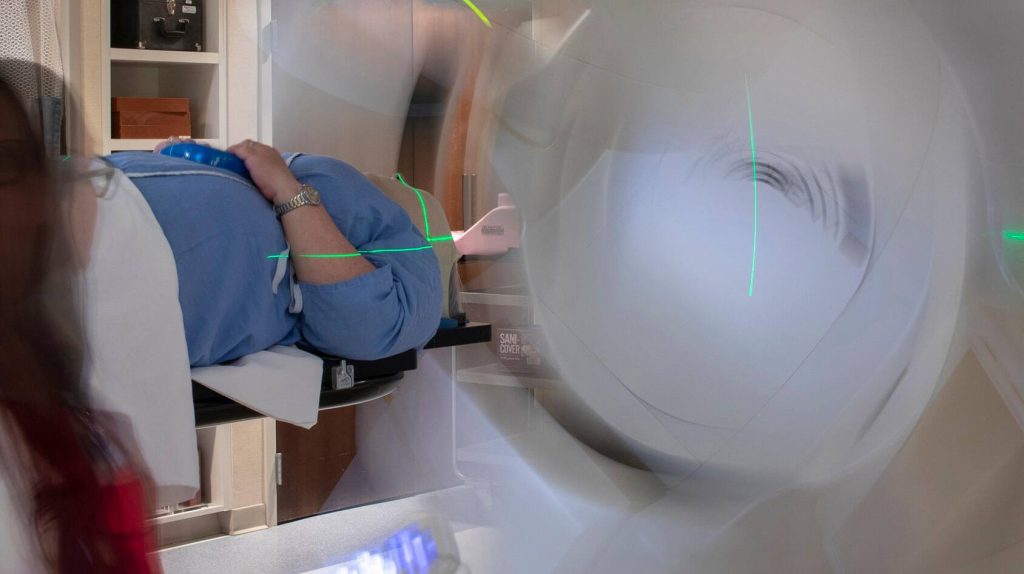-
Cancer
Mayo Clinic experts present key radiation oncology findings at ASTRO

ROCHESTER, Minn. — Mayo Clinic Comprehensive Cancer Center researchers will present their latest radiation oncology findings at the 2025 American Society for Radiation Oncology (ASTRO) Annual Meeting, scheduled to be held Sept. 27–Oct. 1 at the Moscone Center in San Francisco. The ASTRO Annual Meeting is recognized as the largest radiation oncology gathering in the world, and this year's event will feature 14 education sessions and 45 abstracts highlighting Mayo Clinic's advancements in radiation oncology.
Mayo Clinic's presentations this year span innovative clinical research, advanced imaging techniques and innovative treatment approaches that are reshaping radiation oncology and diversifying its benefits to patients.
Highlights of the event include:
Education Session: Liquid Biopsy Early Detection of Cancer
Presentation time: Saturday, Sept. 27, 1:17–1:32 p.m. PDT
Session title: PRO 04 - Liquid Biopsies in Cancer
Description: Dr. Aadel Chaudhuri will co-lead this session highlighting Mayo Clinic's leadership in advancing liquid biopsy (circulating tumor DNA, or ctDNA) technologies for cancer care, with a focus on clinical applications in post-treatment monitoring and early detection. The session is designed for clinicians and colleagues, emphasizing practical use, near-term innovations and Mayo's role in shaping precision medicine.
PRESENTER: Aadel Chaudhuri, M.D., Ph.D., radiation oncologist
Scientific Session: 127 - Mid-Treatment ctDNA to Predict Outcomes in Stage IIB-IIIC NSCLC Treated with MRI-Adapted Chemoradiation
Presentation time: Sunday, Sept. 28, 2:30–2:40 p.m. PDT
Session title: SS 05 - Lung 1: NSCLC Locally Advanced and Oligometastatic
Description: This study showed that a simple, Medicare-covered blood test could help care teams identify — before treatment begins — which patients with stage 3 lung cancer are most likely to benefit from treatment and which may be at higher risk of relapse. Repeating the test during the second week of therapy revealed early signs of whether treatment was working, well before changes appeared on scans. This could potentially create an opportunity to adjust treatment sooner, possibly sparing patients from ineffective therapy and added side effects.
PRESENTER: Ayesha Hashmi, M.D., postdoctoral research fellow, Radiation Oncology (senior author is Aadel Chaudhuri, M.D., Ph.D.)
Scientific Session: 144 - Early Outcomes of a Phase III Randomized Controlled Trial Comparing Ultra-Hypo Fractionated 5 Fraction Treatment vs. Hypofractionated 15 Fraction Treatment for Patients Receiving Regional Nodal Irradiation
Presentation time: Sunday, Sept. 28, 5:25–5:35 p.m. PDT
Session title: Breast Cancer 1: Redefining Radiation Schedules: Hypofractionation and APBI Across the Breast Cancer Spectrum
Description: This is a phase 3 clinical trial that compared a five-fraction course of regional nodal irradiation to the standard 15 or more fractions used in breast cancer, finding that toxicity, quality of life and implant outcomes were more favorable with the shorter regimen. This supports five treatments as a safe and more convenient alternative.
PRESENTER: Carlos Vargas, M.D., radiation oncologist
Poster Q&A: 2596 - CSF-Derived cfDNA Methylation Profiling to Distinguish True Progression from Radiation Necrosis and Pseudoprogression in GBM Patients
Presentation time: Monday, Sept. 29, 8–9 a.m. PDT
Session title: PQA 03 - Central Nervous System, Professional Development/Medical Education
Description: This study evaluated whether a test measuring DNA in cerebrospinal fluid could serve as a useful companion to post-radiation imaging in glioblastoma. If effective, this test could help distinguish true tumor progression from treatment-related changes, guiding whether patients need a biopsy or can be safely monitored.
PRESENTER: Lili Greiner, research assistant, Liquid Biopsy and Translational Immunogenomics Lab (senior author is Aadel Chaudhuri, M.D., Ph.D.)
Presidential Address
Presentation time: Monday, Sept. 29, 1:02–1:30 p.m. PDT
Session title: Address 02 - Presidential Address
Description: In his presidential address, Dr. Sameer Keole, a Mayo Clinic radiation oncologist, will discuss the meeting's theme, "Rediscovering Radiation Medicine and Exploring New indications," radiation therapy's potential uses for nonmalignant disease and the future of radiation oncology.
PRESENTER: Sameer Keole, M.D., president of ASTRO
Learn more about 2025 ASTRO.
###
About Mayo Clinic
Mayo Clinic is a nonprofit organization committed to innovation in clinical practice, education and research, and to providing compassion, expertise and answers to everyone who needs healing. Visit the Mayo Clinic News Network for additional Mayo Clinic news.
About Mayo Clinic Comprehensive Cancer Center
Designated as a comprehensive cancer center by the National Cancer Institute, Mayo Clinic Comprehensive Cancer Center is defining the cancer center of the future, focused on delivering the world's most exceptional patient-centered cancer care for everyone. At Mayo Clinic Comprehensive Cancer Center, a culture of innovation and collaboration is driving research breakthroughs in cancer detection, prevention and treatment to change lives.
Media contact:
- Brittany Cordeiro, Mayo Clinic Communications, newsbureau@mayo.edu







